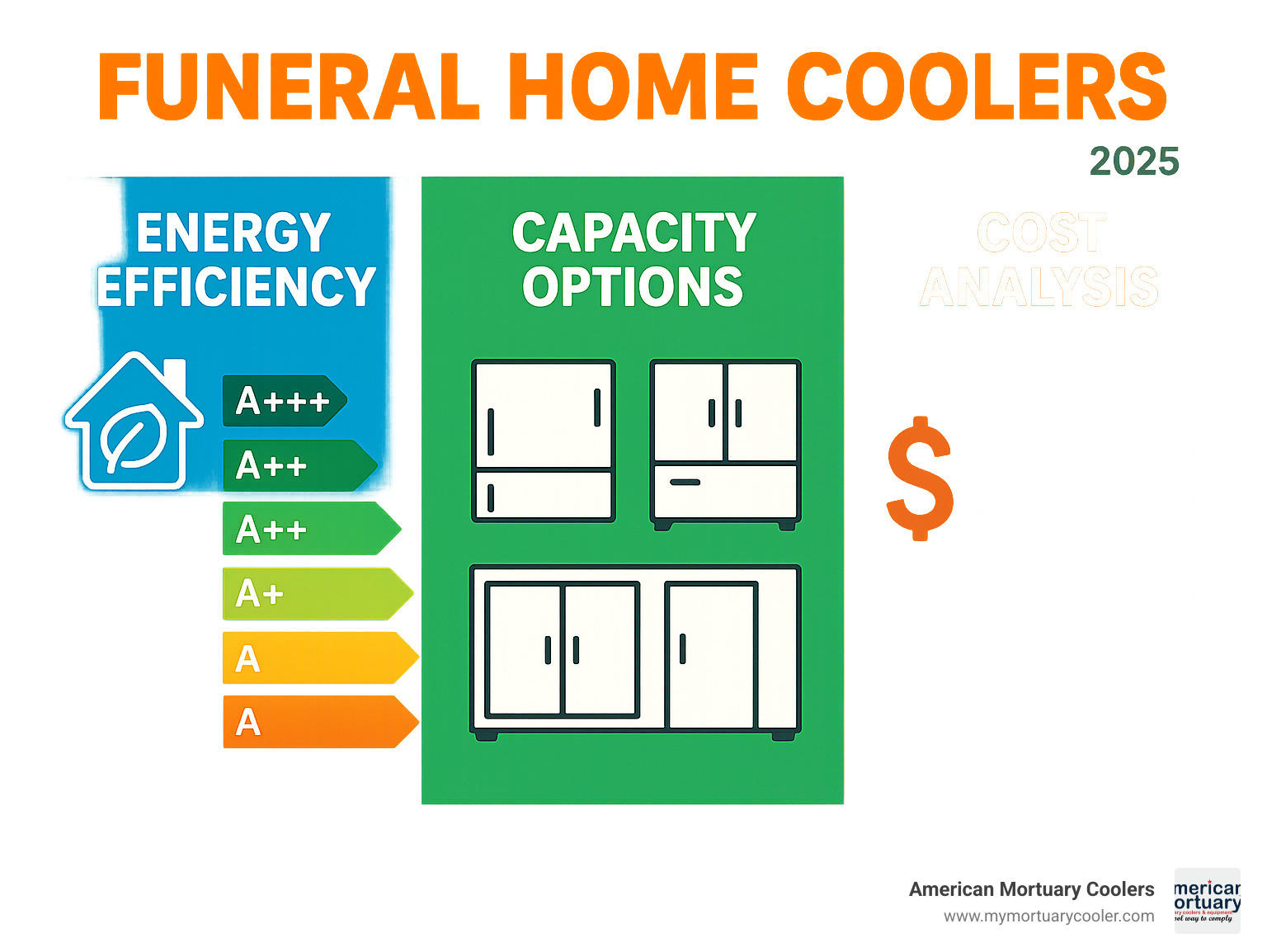Why Funeral Home Coolers Are Essential for Modern Mortuary Operations
A funeral-home-cooler- is a specialized refrigeration unit designed to temporarily preserve human remains at optimal temperatures between 2°C to 4°C (35.6°F to 39.2°F). These units serve three critical functions:
Primary Functions:
- Preservation - Slows natural decomposition processes
- Public Health - Prevents bacterial growth and disease transmission
- Professional Standards - Maintains dignified care and flexible scheduling
Key Differences from Commercial Refrigeration:
- Heavy-duty racks supporting 400+ pounds per body
- Antimicrobial surfaces meeting NSF sanitation standards
- Digital temperature controllers with alarm systems
- Self-contained design requiring only standard 110V power
The science is straightforward: human body temperature drops from 98.6°F to the optimal storage range within hours of death. Without proper refrigeration, decomposition accelerates rapidly, especially during warmer months. Refrigeration is considered a fundamental best practice in funeral service, and failure to provide it often results in inspection failures.
While not always explicitly mandated by law, funeral-home-cooler- units are implicitly required through provincial health guidelines in Canada and state licensing requirements in the U.S. Modern funeral homes rely on these systems to manage scheduling flexibility, maintain professional standards, and ensure public health compliance.
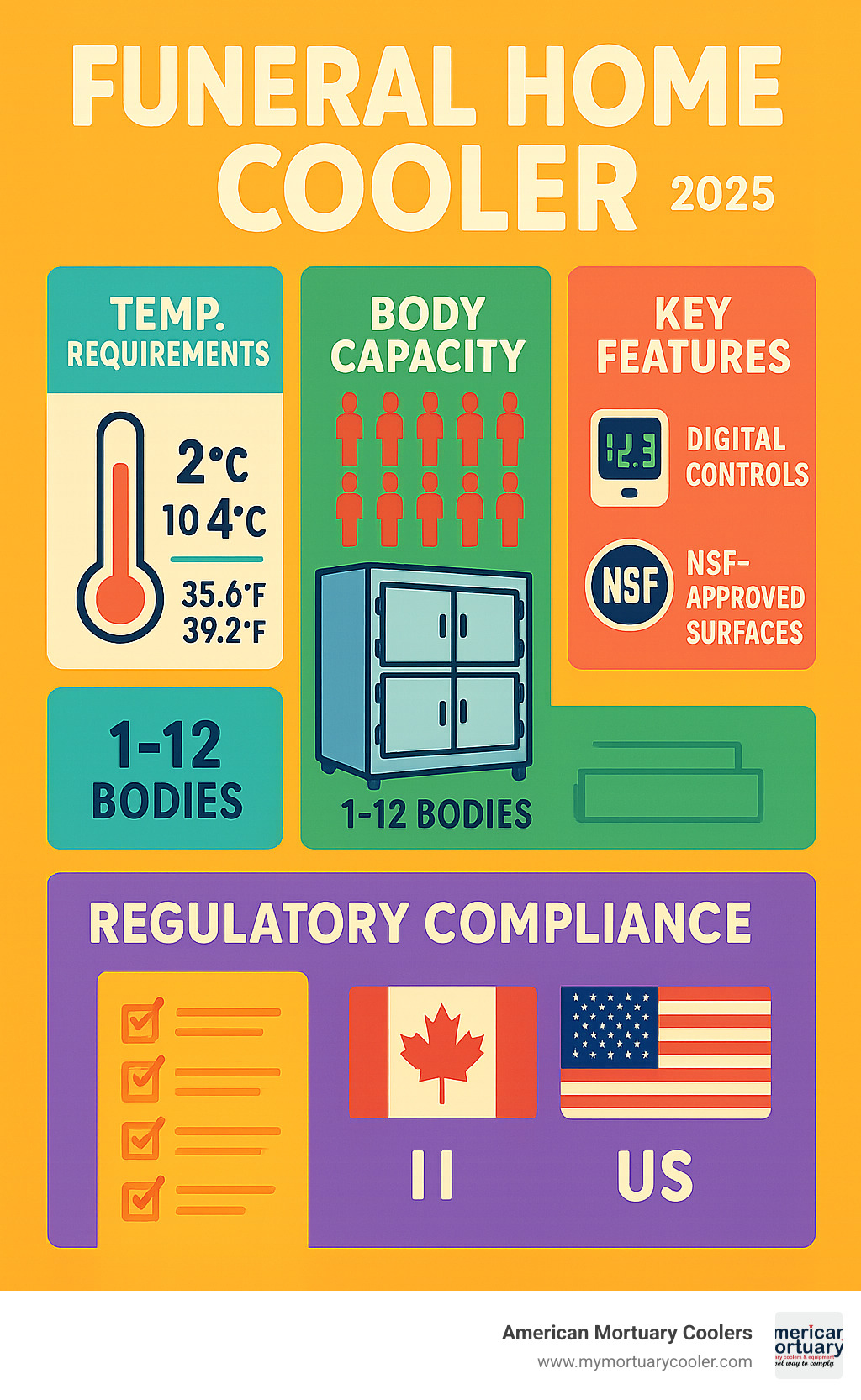
Related content about funeral-home-cooler-:
What Is a Funeral Home Cooler and Why It Matters
A funeral-home-cooler- serves as the quiet guardian of dignity in every funeral home. These specialized refrigeration units preserve precious time for grieving families while maintaining the highest standards of care and public health.
At its heart, a funeral home cooler creates a controlled environment that slows the natural decomposition process. This gives families the gift of time - time to notify distant relatives, plan meaningful services, and make thoughtful decisions without pressure.
The importance goes beyond simple refrigeration. These systems serve as the first line of defense in infection control, preventing bacterial growth that could pose health risks to funeral home staff and visitors. They also uphold the professional standards that families expect during their most vulnerable moments.
From a public perception standpoint, proper preservation demonstrates respect and professionalism. Families trust funeral homes to care for their loved ones with dignity, and a reliable cooler system is essential to maintaining that trust.
The decomposition science is straightforward: bacteria thrive at body temperature but slow dramatically in cold environments. By maintaining optimal temperatures, funeral home coolers create stable conditions that preserve both physical integrity and family peace of mind.
Core Functions of a Funeral-Home-Cooler-
The primary purpose of any funeral-home-cooler- centers on slowing decomposition through precise temperature control. By maintaining that critical 2°C to 4°C range, these units dramatically reduce bacterial activity and tissue breakdown.
But here's what really matters: flexible scheduling. Without refrigeration, funeral directors face impossible time constraints, especially during summer months. Families need time to coordinate travel, book venues, and make arrangements. A quality cooler system transforms a rushed 24-hour window into weeks of flexibility.
Consider the real-world impact: a family member passes away on Friday evening, and relatives need to travel from across the country. Without proper preservation, the funeral would need to happen by Sunday. With a reliable funeral-home-cooler-, families can plan services for the following weekend.
Consistent temperature preservation matters more than hitting exact degrees. Temperature fluctuations cause more damage than slightly warmer storage, which is why quality units include digital controllers and alarm systems to maintain stable environments around the clock.
How Funeral Home Coolers Differ From Commercial Fridges
While your local restaurant's walk-in cooler stores food, funeral-home-cooler- units face entirely different engineering challenges.
The body-weight load factor separates mortuary equipment from everything else. Standard refrigerator shelves would collapse instantly, but funeral home coolers feature specialized racks built to support 400+ pounds safely. These are heavy-duty chrome-plated hardware designed for decades of reliable service.
Temperature precision represents another crucial difference. Commercial units often swing several degrees without anyone noticing, but the narrow 2-4°C range required for proper preservation demands specialized controls and superior insulation systems.
NSF sanitation standards make mortuary coolers unique in the refrigeration world. These units feature sealed interiors with seamless fiberglass construction and antimicrobial surfaces that eliminate every crack and crevice where bacteria could hide. Hospital-grade cleanliness isn't optional - it's built into every surface.
Laws, Regulations, and Temperature Requirements (Canada & U.S.)
Most jurisdictions don't explicitly say "you must have a cooler," but they make it clear that proper preservation isn't optional through funeral-home-cooler- regulations.
The golden standard across North America is 2°C to 4°C (that's 35.6°F to 39.2°F). This range hits the sweet spot where bacterial activity slows dramatically without risking tissue damage from freezing.
Both Canadian and U.S. authorities focus on the same core principles: public health protection, sanitary conditions, and professional standards. While the specific wording varies by province or state, the practical outcome is the same - if you're storing human remains for more than a few hours, you need proper refrigeration.
Inspection logs tell the real story. Regulators expect detailed temperature records, maintenance documentation, and proof that your equipment meets professional standards. Miss these requirements, and licensing issues follow quickly.
Canadian Compliance Snapshot
Canadian funeral homes operate under a provincial patchwork of regulations that share common DNA. Each province handles funeral licensing differently, but they all circle back to the same core requirement: maintain sanitary conditions that protect public health.
The smart approach treats record-keeping as sacred. Temperature logs, maintenance schedules, and equipment documentation aren't just paperwork - they're your insurance policy during inspections. Provincial authorities will review these records closely, and gaps often trigger deeper investigations.
Best practice guidelines consistently point toward refrigeration as the professional standard. Even provinces without explicit cooler mandates expect proper preservation methods. Most funeral directors consider refrigeration non-negotiable.
The inspection failure risks are real. License suspensions, public scrutiny, and professional reputation damage can result from inadequate preservation standards.
U.S. Regulatory Checklist
American funeral homes steer a three-layer regulatory sandwich: federal guidelines, state licensing requirements, and local building codes.
OSHA workplace safety standards require protection for employees handling human remains. Proper refrigeration directly supports these requirements by minimizing exposure risks and maintaining sanitary working conditions.
State funeral boards provide the primary oversight through licensing requirements. While specific equipment isn't always mandated, terms like "sanitary facilities" and "proper preservation methods" consistently appear in regulations. Regulatory interpretations universally expect refrigeration for extended storage.
CDC guidance emphasizes infection control through proper preservation techniques. Their recommendations strongly support refrigeration as a fundamental public health measure.
The walk-in insulation codes add another compliance layer through DOE 2009 energy regulations. These federal standards set minimum insulation requirements that affect both new installations and major renovations.
Choosing the Right funeral-home-cooler-: Types, Sizes, Features
Shopping for a funeral-home-cooler- becomes much clearer once you understand your basic needs. You can get units ranging from compact 1-body coolers (perfect for smaller funeral homes) all the way up to massive 12-body systems that handle high-volume operations. Most funeral directors find their sweet spot with 2-body, 3-body, or 4-body units - they provide great flexibility without taking over your entire prep room.
The configuration matters just as much as size. Roll-in units work beautifully with your existing mortuary cots and gurneys - staff can wheel bodies right in without any lifting. Upright models save floor space by stacking storage vertically. Side-loading coolers are lifesavers when you're working with tight spaces, and telescoping rail systems make body handling much safer for your team.
Modern funeral-home-cooler- units are completely self-contained and plug into standard 110V outlets. No special electrical work needed. They come with digital controllers for precise temperature management, plus impressive warranties - typically 15 years on panels and 5 years on mechanical components.
| Configuration | Best For | Pros | Cons |
|---|---|---|---|
| Roll-in | Standard workflow | Easy loading, familiar operation | Requires more floor space |
| Upright | Space efficiency | Compact footprint, multiple tiers | More lifting required |
| Walk-in | High volume | Maximum capacity, easy access | Higher cost, more space needed |
| Side-loading | Tight spaces | Space efficient, good ergonomics | Limited capacity options |
funeral-home-cooler- Capacity Calculator
Getting the capacity right requires honest math about your operation. Start with your average daily case load, then multiply by 3-4 days to account for weekend storage and scheduling flexibility. Add another 25-50% for growth and those unexpected busy periods.
Don't forget about seasonal patterns. Many funeral homes see higher case loads during winter months, and holiday periods can create scheduling nightmares that require extra storage capacity. More info about cooler capacity walks through detailed calculations for different scenarios.
Emergency planning protects both your community service role and business continuity. Natural disasters, disease outbreaks, or mass casualty events can overwhelm your normal capacity overnight.
funeral-home-cooler- Features Checklist
Today's funeral-home-cooler- units come loaded with impressive features. High R-value insulation (look for 4+ inches of high-density foam) keeps energy costs down while maintaining rock-solid temperature stability.
Antimicrobial surfaces aren't just fancy marketing - they're essential for meeting sanitation requirements. NSF-approved interiors with seamless fiberglass construction eliminate those hard-to-clean cracks and crevices where bacteria love to hide.
Low-ambient controls are worth their weight in gold if your unit will be installed in an unheated space or extreme climate. Remote monitoring capabilities provide incredible peace of mind through smartphone alerts for temperature problems or equipment failures.
Customization options keep expanding. You can get PMS color matching to blend with your facility's aesthetics, specialized shelving configurations for unique needs, and upgraded lighting systems that maintain dignity during viewings.
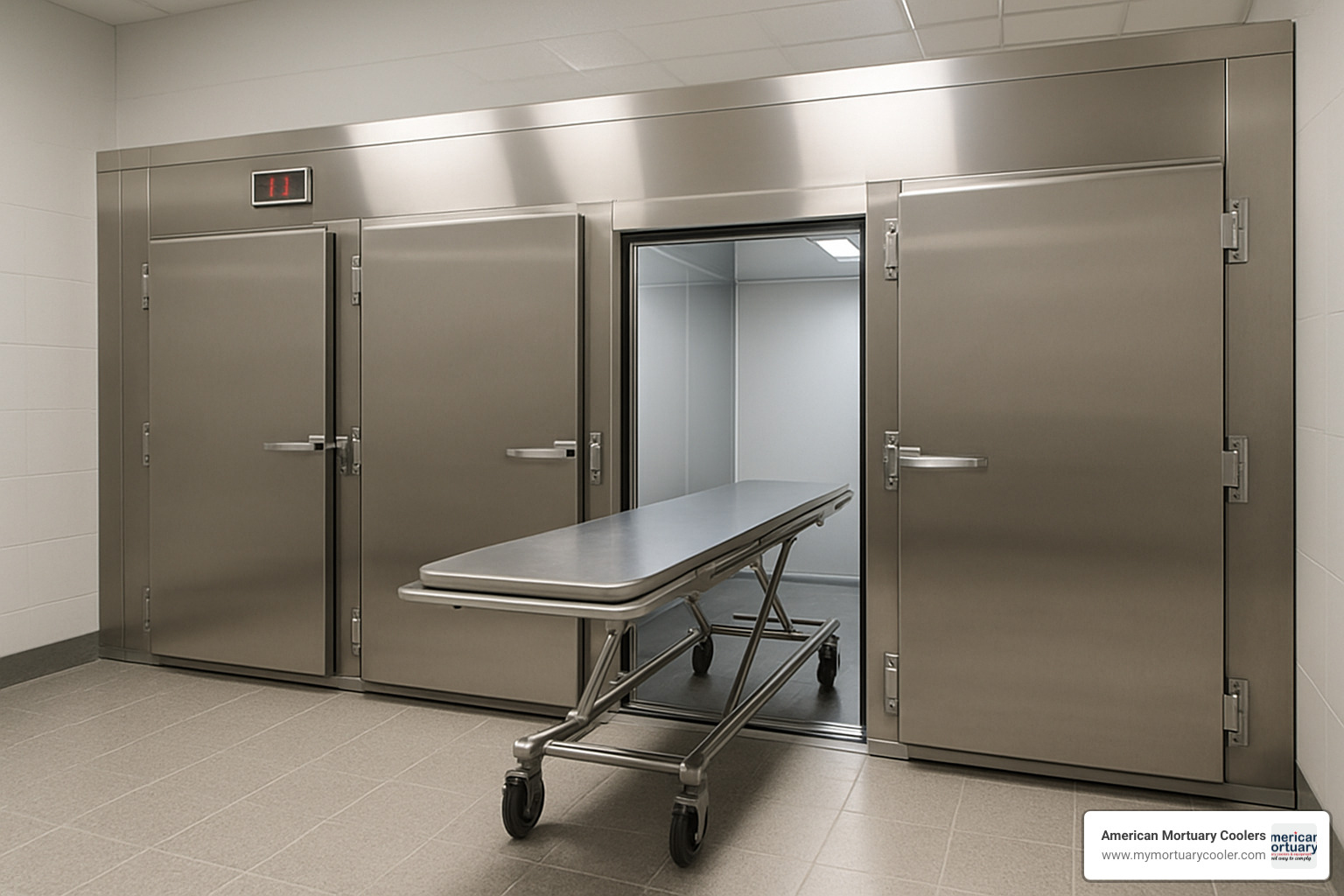
Costs, Energy Efficiency, Delivery & Installation
Funeral-home-cooler- prices vary dramatically based on size and features, but you can expect to invest anywhere from $5,800 to $33,000 for a quality unit.
On the budget-friendly end, a basic 1-body roll-in unit starts around $5,799 - perfect for smaller funeral homes. Mid-range options like 3-4 body units typically run $12,000-$18,000, while high-capacity 12-body systems can reach $33,525. Walk-in coolers occupy their own category, with a standard 10'×10' unit priced around $13,995.
CoolBot technology offers a game-changing alternative for high-volume needs. A complete 8'×12' walk-in setup using CoolBot costs approximately $5,000 and can store up to 25 bodies. That's incredible value for funeral homes handling higher case loads.
Energy efficiency affects your bottom line every month. Well-insulated units typically consume 3-5 kWh daily, translating to roughly $30-50 in monthly electricity costs. Quality insulation pays for itself through lower operating expenses.
Financing options abound in today's market. Traditional equipment loans, leasing programs, and rent-to-own arrangements all provide pathways to ownership. Many manufacturers offer direct financing with competitive rates.
Budgeting for Ownership vs. Rental
Sometimes buying isn't the right answer. Polar Leasing and similar companies provide rental options that make perfect sense for temporary needs, seasonal surges, or emergency situations. If you're dealing with disaster response or unexpected equipment failure, rental units can be lifesavers.
The total cost of ownership calculation tells the real story. Beyond the purchase price, factor in financing costs, energy consumption, maintenance expenses, and eventual replacement costs. A quality unit often justifies its higher upfront cost through lower operating expenses and longer service life.
Don't forget about business disruption costs. When your cooler fails during a busy week, you're not just dealing with repair expenses - you're potentially losing revenue and damaging your reputation.
Installation & Warranty Essentials
Modern funeral-home-cooler- units are designed for straightforward installation. Many feature cam-lock panel construction that goes together like high-end furniture. Smaller units often arrive fully assembled and ready for plug-and-play operation.
Site preparation is refreshingly simple for most units. You need level flooring and adequate clearance for ventilation. Larger walk-in units may require a structural engineer to verify floor loading capacity, but most prep rooms handle standard units without modification.
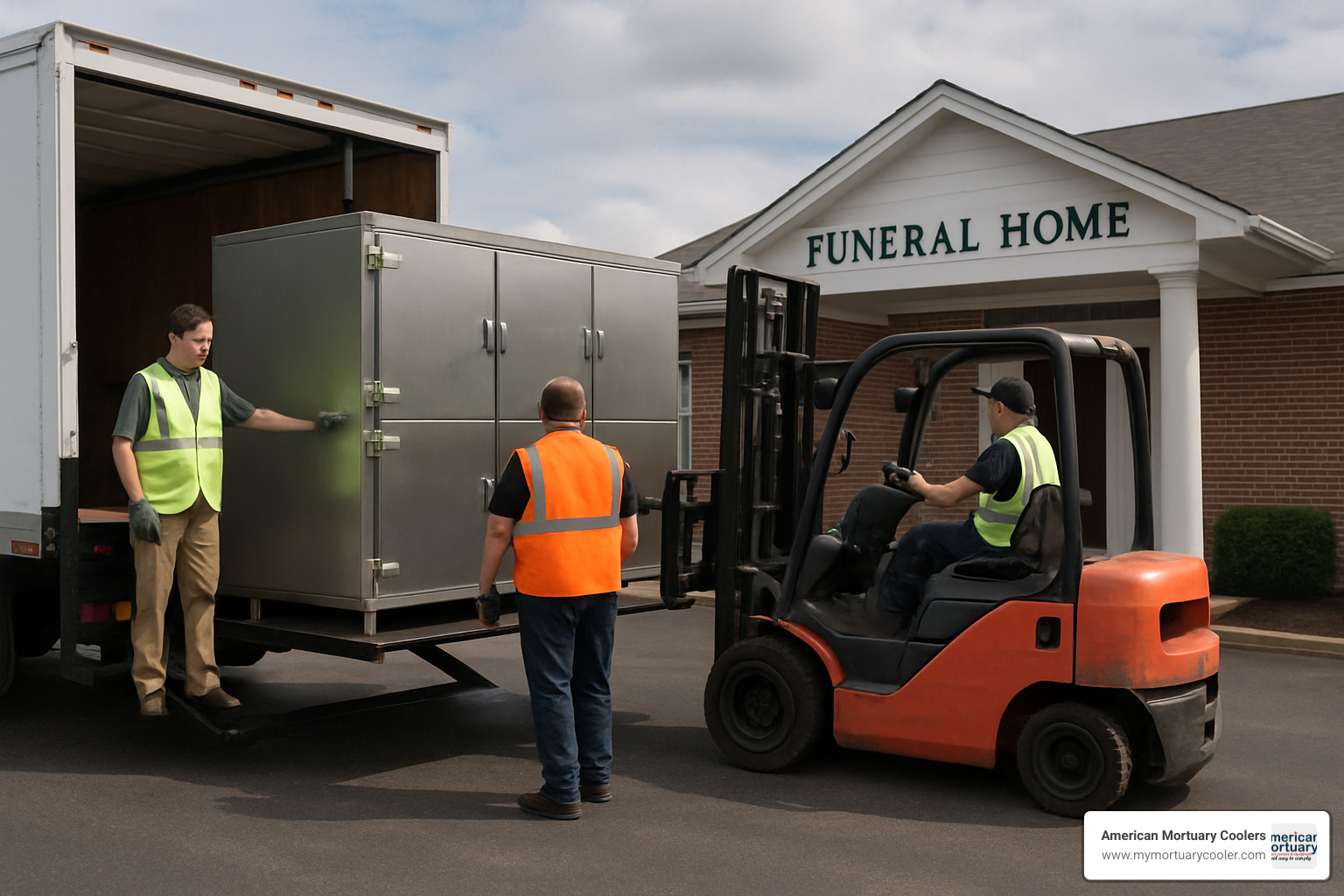
Delivery logistics require some planning, especially for larger units. Forklift access is typically required unless you have a loading dock. Lift-gate service adds to the cost but enables delivery to locations without loading facilities.
Warranty coverage varies dramatically between manufacturers. Look for comprehensive protection including 15-year panel warranties and 5-year mechanical component coverage. A responsive service network matters too - the best warranty is worthless if you can't get parts and service when needed.
Maintenance, Sanitation & Safety Best Practices
Taking care of your funeral-home-cooler- isn't just about protecting your investment – it's about maintaining the trust families place in your care. Regular maintenance ensures your equipment runs reliably when you need it most, while proper sanitation protects both your staff and the families you serve.
The daily routine is simple but crucial. Temperature logging should happen every morning, and many licensing authorities require these records during inspections. Weekly maintenance takes just a few minutes but prevents bigger headaches. Gasket cleaning with approved disinfectants keeps seals tight and prevents odors from escaping.
Quarterly tasks require more effort but pay huge dividends. Coil cleaning ensures your unit doesn't work harder than necessary, keeping energy costs down and extending equipment life. Most funeral directors are surprised how much dust and debris accumulates on condenser coils.
Annual professional inspections catch problems before they become emergencies. There's nothing worse than finding your cooler failed on a busy weekend when you need it most. A qualified technician can spot issues that aren't obvious to daily users.
Modern remote monitoring systems act like a 24/7 security guard for your equipment. These systems send smartphone alerts for temperature problems, power failures, or equipment malfunctions.
Cleaning Protocol Step-by-Step
Cleaning a funeral-home-cooler- properly requires the right approach and the right products. This isn't the place to cut corners – families trust you with their most precious cargo.
Start by unplugging the unit and removing all trays and accessories. These components need separate cleaning, and you can't properly sanitize around them.
Hospital-grade sanitizers are non-negotiable for mortuary equipment. Regular household cleaners simply aren't designed for this environment. Look for products specifically approved for mortuary use.
Pay special attention to corners, seals, and drainage areas where bacteria love to hide. These spots often get overlooked during quick cleanings, but they're exactly where problems start.
Thorough rinsing removes sanitizer residue that could cause problems later. Follow up with complete drying before reassembly. Document everything for regulatory compliance, including cleaning dates and products used.
Temperature recovery verification ensures your unit returns to proper operating conditions before you put it back in service.
Preventive Maintenance Schedule
A good maintenance schedule prevents most equipment failures before they happen. The key is consistency – sporadic maintenance is almost as bad as no maintenance at all.
Monthly compressor checks take just a few minutes but reveal a lot about your unit's health. Look for oil leaks, listen for unusual noises, and feel for excessive vibration. Your compressor is the heart of the system.
Door seal inspection should happen monthly too. Worn seals waste energy and compromise temperature control. If you can slip a dollar bill through a closed door seal, it's time for replacement.
Quarterly alarm testing ensures your safety systems work when you need them. Test temperature alarms, power failure alerts, and any remote monitoring features.
Annual professional service should include refrigerant level checks, electrical connection inspection, and control calibration verification.
Record retention requirements vary by location, but most jurisdictions expect 2-3 years of maintenance documentation. More info about sanitizing coolers offers additional guidance on maintaining proper documentation.
Smart funeral directors treat maintenance as insurance – a small investment that prevents much larger problems down the road.
Innovations, Portable & Rental Options
The funeral-home-cooler- world is buzzing with exciting innovations that are making life easier for funeral directors everywhere. One of the coolest developments is CoolBot technology - a game-changer for operators watching their budgets closely.
Here's how CoolBot works: instead of buying expensive commercial refrigeration equipment, you use a regular air conditioner paired with specialized controls. The result? A fully functional walk-in cooler at a fraction of the traditional cost. We're talking about complete 8'×12' systems for around $5,000 that can handle up to 25 bodies.
Mobile mortuary units are another innovation that's proving invaluable. These aren't just refrigerated trucks - they're complete mortuary facilities on wheels. During natural disasters, disease outbreaks, or mass casualty events, these trailer-mounted systems provide full service capabilities including refrigeration, preparation areas, and even viewing facilities.
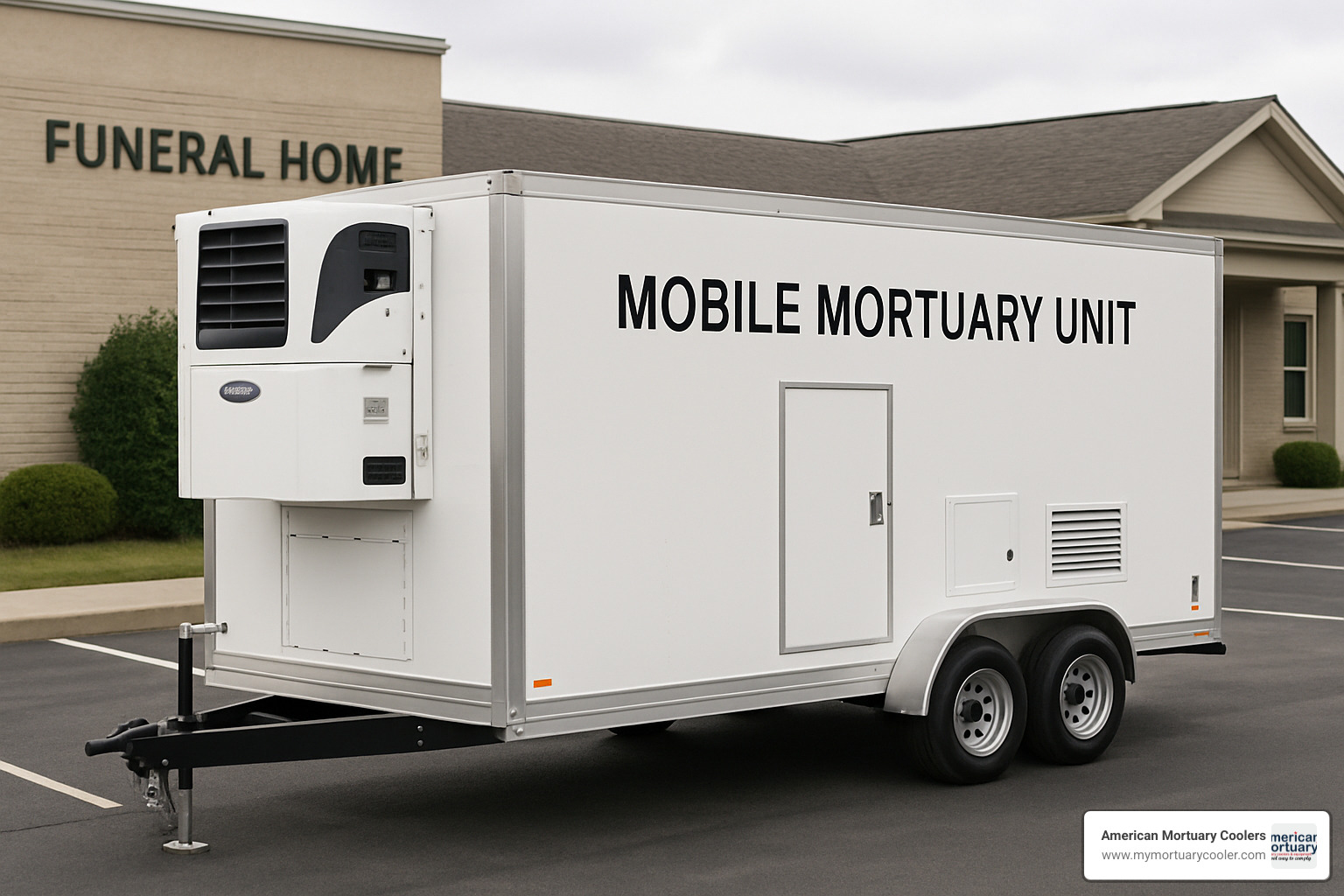
The beauty of modular panel construction means you're not locked into your original design forever. Need more capacity? Add another section. Want to reconfigure your layout? Modular systems make it possible without tearing down walls.
IoT temperature monitoring brings your cooler into the smartphone age. These cloud-based systems provide real-time data, send alerts to your phone, and even offer predictive maintenance capabilities. No more wondering if your cooler is maintaining proper temperature at 2 AM.
Environmental consciousness is driving adoption of low-GWP refrigerants and energy-efficient components. Some manufacturers now offer solar-ready designs for funeral homes wanting to reduce their carbon footprint.
For temporary needs or equipment trials, Featured mortuary cooler rentals provide flexible solutions without the upfront investment.
Trend Watch: Energy-Smart & Custom Builds
Customization has reached impressive levels in today's market. PMS color matching means your cooler can blend seamlessly with your facility's aesthetics - no more settling for basic white boxes that clash with your carefully designed prep room.
Split-system designs are gaining popularity because they solve a common problem: noise and heat. By separating the compressor unit from the storage area, these systems keep your prep room quieter and cooler while maintaining excellent refrigeration performance.
AI-powered monitoring systems represent the cutting edge of cooler technology. These smart systems learn your usage patterns and can predict maintenance needs before problems occur. They optimize energy consumption automatically while maintaining precise temperature control.
Solar integration is becoming increasingly practical as panel costs drop and battery storage improves. Grid-tied systems with battery backup provide energy independence and ensure your cooler keeps running even during power outages.
Smart controls put unprecedented control at your fingertips. Modern systems enable remote temperature adjustment, usage tracking, and energy optimization through mobile apps.
Frequently Asked Questions About Funeral Home Coolers
Are funeral home coolers legally required?
Here's the honest truth: while most regulations don't explicitly say "you must have a funeral-home-cooler-," they practically require it through the back door. Canadian provincial health authorities and U.S. state funeral boards all expect "proper preservation methods" and "sanitary conditions" - and guess what? Room temperature storage doesn't qualify.
I've seen too many funeral homes learn this lesson the hard way during inspections. Regulators may not spell out "refrigeration required" in bold letters, but they absolutely expect it when they walk through your facility. The industry standard is crystal clear, and deviating from it puts your license at risk.
Think of it this way: you wouldn't operate without liability insurance just because it's not explicitly mandated in every jurisdiction. Some things are simply too important to gamble with, and proper refrigeration falls squarely in that category.
What temperature should I set my cooler to?
The sweet spot for your funeral-home-cooler- is 2°C to 4°C (or 35.6°F to 39.2°F if you prefer Fahrenheit). This range hits the perfect balance - cold enough to dramatically slow decomposition, but not so cold that you risk tissue damage from freezing.
Here's what really matters: consistency beats perfection. A unit that holds steady at 38°F will outperform one that bounces between 35°F and 42°F every few hours. Those temperature swings actually accelerate decomposition, which defeats the whole purpose.
Most modern units come with digital controllers that make this easy. Set it once, monitor it daily, and keep those temperature logs current. Your inspector will want to see them, and they're your best defense if questions arise about proper storage conditions.
How long can bodies be stored safely?
With proper refrigeration, you're looking at several weeks of safe storage - but let's be practical about this. Most funeral homes plan for 3-7 days because that's what families typically need for scheduling services and making arrangements.
The actual timeline depends on several factors: the condition of the body when it arrives, whether any preparation has been done, and what type of services are planned. A body that arrives in good condition and is properly refrigerated can safely wait much longer than one that's been compromised by heat or delayed findy.
Extended storage beyond two weeks gets into territory where you'll want to have conversations with families about additional preservation options. It's not that refrigeration stops working - it's that families deserve to understand their options and make informed decisions.
Keep detailed records of storage duration and conditions. This protects you professionally and helps families understand the timeline for their decision-making process.
Conclusion & Next Steps
Choosing the right funeral-home-cooler- isn't just about buying equipment - it's about investing in your funeral home's foundation. These specialized systems protect public health, ensure regulatory compliance, and help you provide the dignified care that families deserve during their most difficult moments.
Start with your capacity needs - both current and projected. That 2-body unit might handle today's volume perfectly, but what about next year? Growth planning now saves expensive upgrades later. Remember to factor in those unexpected surges that always seem to happen at the worst possible times.
Temperature consistency trumps fancy features every time. A reliable unit maintaining steady 2°C to 4°C temperatures outperforms the most sophisticated system that can't hold stable conditions. Digital controls and alarm systems aren't luxury items - they're essential tools for maintaining professional standards.
Maintenance and documentation protect both your investment and your license. Those daily temperature logs and cleaning protocols might feel tedious, but they're your best defense during inspections. Plus, proper maintenance extends equipment life dramatically, making your initial investment pay dividends for years.
The funeral service industry continues evolving, with innovations like IoT monitoring, energy-efficient designs, and mobile solutions expanding possibilities. But the fundamentals remain unchanged: reliable preservation, regulatory compliance, and dignified care.
At American Mortuary Coolers, we've seen how the right refrigeration system transforms funeral home operations. Based here in Tennessee with delivery throughout the contiguous 48 states, we've helped funeral directors from small rural communities to major metropolitan areas find solutions that fit their unique needs and budgets.
Every funeral home faces different challenges - space constraints, budget limitations, regulatory requirements, and community expectations. That's why we specialize in custom solutions rather than one-size-fits-all approaches. Your funeral home deserves equipment designed specifically for your situation.
Don't let equipment concerns keep you awake at night. Quality funeral-home-cooler- systems provide reliable operation and peace of mind, allowing you to focus on what really matters - serving families with compassion and professionalism.
Ready to take the next step? Our comprehensive buying guide walks through everything covered here in even greater detail, with specific recommendations for different scenarios and budgets.
